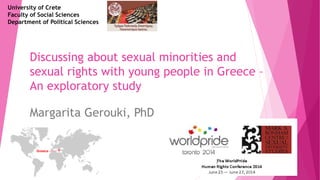WorldPride Human Rights conference 2014 Gerouki
- 1. Discussing about sexual minorities and sexual rights with young people in Greece ŌĆō An exploratory study Margarita Gerouki, PhD University of Crete Faculty of Social Sciences Department of Political Sciences
- 2. Adolescents at risk Between 5% and 11% of the young population is identified as non-heterosexual. Also, a number of young people struggle with non-conforming gender identity. The vast majority of non-heterosexual, non-gender conforming young people acknowledged their sexual orientation from the high school years already. Psychosocial adjustment is lower among sexual minority adolescents compared to sexual majority adolescents. There appears to be a link between higher level of illegal drug use and alcohol consumption among the non-heterosexual young people. Non-heterosexual and/or non gender conforming adolescents suffer high level of violence, abuse and discrimination even at school. As a result to such experiences many LGBT adolescents report frequent absences from school but also self-harming behaviors, suicidal feelings and attempt suicides.
- 3. In GreeceŌĆ” People regard homosexuality as taboo. Non-heterosexual people is an invisible group within society. The Greek Orthodox Church considers homosexuality as a sin and the person who shows a homosexual orientation as sinful. Greek population holds a negative picture for homosexuals and believes that homosexuality poses dangers for the society. Greek young people regard homosexuality as a threat, moreover they affirm that school is a hostile environment for non-heterosexual youngsters thriving of different homophobic behaviors.
- 4. Sexual minorities face discrimination in Greece... ’ā╝ Same-sex partnerships are not legitimate. ’ā╝ Neither same-sex spouses even if they hold a valid marriage certificate in another EU member state. ’ā╝ 48% of LGBT respondents felt discriminated or harassed because of their sexual orientation. ’ā╝ 21% felt discriminated at work or when searching for employment ’ā╝ 34% felt discriminated when buying goods or accessing services. HoweverŌĆ”
- 5. Vallianatos and others vs Greece (nos: 29381/09 and 32684/09) On November 2013 the European Court of Human Rights condemned Greece for allowing (strictly) different-sex couples to enter civil unions. Law on reforms concerning the family, children and society (no 3719/2008) These provisions establish the concept of a special prejudicial act in public law, creating State liability in tort. ŌĆ£the Church is against of such a law underpins and legalizes serious moral sins. In case of application of such law it will become a catastrophic bomb to the foundation of the Christian family and all Greek societyŌĆØ
- 6. The case of Anna / 2012
- 7. The present study: theoretical framework, research questions and methods How students talk about sexual minorities? How LGBT people are perceived by their peers in school? How young people understand sexual rights? Individual interview Focus group discussion Questionnaire The politics of recognition and social justice Researchquestions Research methods
- 8. Results: How students talk about sexual minorities? Non-heterosexuality or non gender-conforming as out-of-the ordinary behavior of choice. Homosexuals are not 100% normal. It is not accidental that you need male- female for reproduction. ŌĆ”people they have chosen a different sexual orientation Homosexuality as a societal pathology. There is a problem in society and this problem is being manifested as homosexuality. I mean we all go to school. There we learn that reproduction is naturally determined for male ŌĆō female unions. When society is too tolerantŌĆ” too much democracy, too much freedom, too much of this and that, that lead people to exaggeration. The manifestation of homosexuality is the exaggeration in society. Mistakes in society and distortions become the mean for a person to become homosexual. The great un-known. I would have liked very much to talk with a homosexual person, to tell me what he felt when attractedŌĆ” I would have like to hear a story. Homosexuality as outcome of bad parenting OR alternative parenting.
- 9. Results: How LGBT people are perceived by their peers in school? They go away from the group. That is, when everybody else is ŌĆ£normalŌĆØ for their own standards and some gay guy comes to the group they wont be comfortable to talk to him, discuss their feelings, communicate. Non-normative behavior has consequences! Students joke about them and some times are violent, not only with words. If you are not provocativeŌĆ” if you donŌĆÖt give reasonsŌĆ” ŌĆ” for students and / or teachers! Why? ŌĆ” and what about people you might know for years? I would not behave in an extreme way to hit him or ridicule him in front of the others, simply I would say to him ironically that since this is your choice, I do not want any contact with you anymore. Ignorance, existential fear for the unknown, challenges existing norms, conservatism, deep rooted social perceptions
- 10. Results: How young people understand sexual rights? ’üĄ The right to be yourself ’üĄ The right to raise a family
- 11. Discussion: the role of education and activism for recognition and social justice ColourYouth GoodasYou(th) LGBTAwarenessClub ╬ØŽä╬ĄŽü╬«-╬æ╬╝╬ĄŽü╬╣╬║╬▒╬Į╬╣╬║╬┐ŽŹ ╬Ü╬┐╬╗╬╗╬Ą╬│╬»╬┐Žģ ╬Ģ╬╗╬╗╬¼╬┤╬┐Žé ╬¤╬╣╬║╬┐╬│╬Ł╬Į╬Ą╬╣╬ĄŽé ╬¤ŽģŽü╬¼╬Į╬╣╬┐ ╬żŽī╬Š╬┐ ╬¤╬╝╬┐Žå╬┐╬▓╬»╬▒ ╬║╬▒╬╣ ╬żŽü╬▒╬ĮŽāŽå╬┐╬▓╬»╬▒ ŽāŽä╬Ę╬Į ╬Ģ╬║ŽĆ╬▒╬»╬┤╬ĄŽģŽā╬Ę ╬ŻŽē╬╝╬▒Žä╬Ą╬»╬┐ ╬źŽĆ╬┐ŽāŽä╬«Žü╬╣╬Š╬ĘŽé ╬ö╬╣╬Ą╬╝ŽåŽģ╬╗╬╣╬║ŽÄ╬Į (╬Ż╬ź╬ö) Queertrans ThessalonikiPride ╬ś╬ĄŽä╬╣╬║╬« ╬”Žē╬Į╬« ╬¤╬ø╬Ü╬Ģ ╬ŻŽŹ╬╝ŽĆŽü╬▒╬Š╬Ę ╬Ü╬▒Žä╬¼ Žä╬ĘŽé ╬¤╬╝╬┐ŽåŽģ╬╗╬┐Žå╬┐╬▓╬»╬▒Žé ACTUPHellas
- 12. Concluding thoughts Education through activism and alliances. Bring people together. Sharing and transforming our experiences into learning is a noble goal. Exposing students in anti-homophobic activities might help them form attitudes of respect towards others and acceptance to people from diverse backgrounds and orientations. Teachers should be aware of different types of minorities. They should be(come) knowledgeable and unbiased practitioners. Being able to reflect and theorize on the issues of (homo)sexuality as part of their professional pre or in-service development will provide teachers with the necessary opportunities to clarify ideas, opinions as well as question their own attitudes and perceptions. Challenging heteronormative attitudes and prejudices. Choices as political! Thank you for your attention! mgerouki@gmail.com www.margaritagerouki.gr












